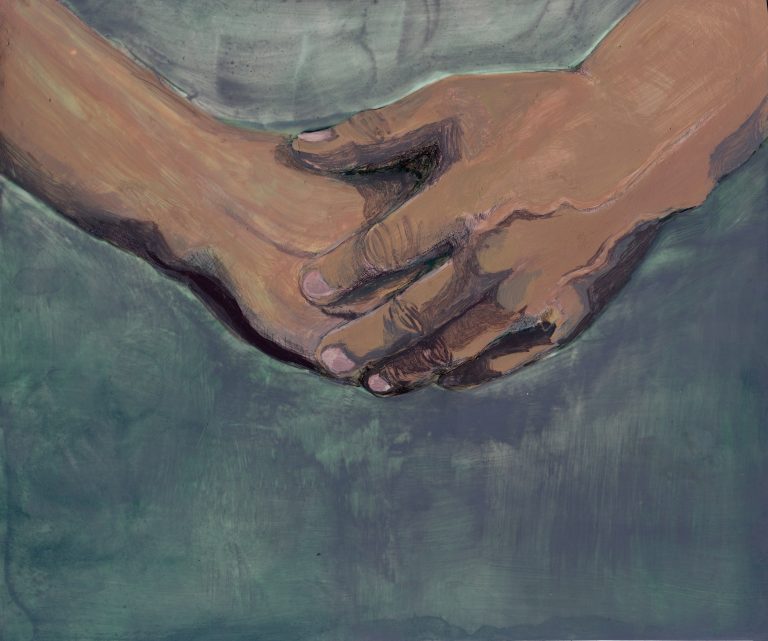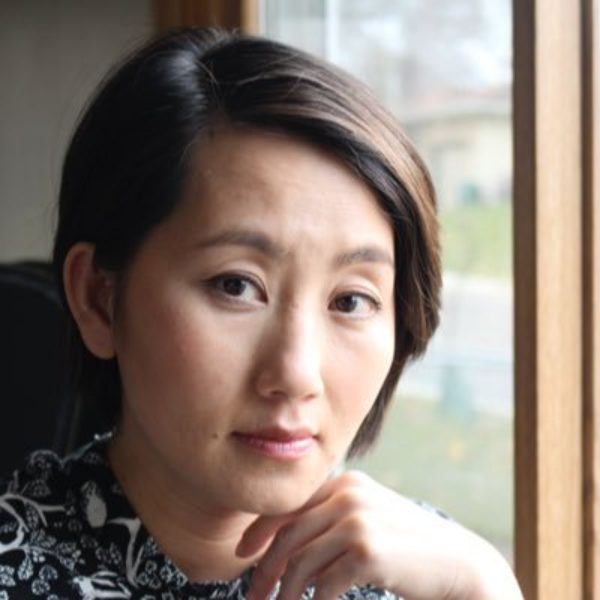
Image by Pang Zong Vang, © All Rights Reserved.
My Father Is Not a Powerful Man: Lessons From My Refugee Father
My father is unemployed. His paperwork says that he is 61 years old. His only source of income is social security. He has a few chickens, some healthy, others not so much. He lives on a stretch of land in cold Minnesota, feet to the ground, eyes to the sky. He takes the weather in the ache of his bones, the burn in his back. My father spends a lot of time looking out the windows when he is not outside, walking along the tree line. There are many men like my father the world over. They give birth to daughters like me. My father is not a powerful man.
When I was young, I believed that my father was powerful.
When I was a little girl in Ban Vinai Refugee Camp and I needed to pee in the dark of night, it was the presence of my father that kept me safe. Beneath the light of the moon, I could see the outlines of the hills that surrounded the camp. I knew that the hills housed many Hmong bodies, lonely, lost spirits who were far away from the people who loved them in Laos, the people they loved, journeying to America and the rest of the world. I could hear the beat of the drums of the dead. Someone new was always dying the old death: suicide. Beyond the touch of the moonlight, I made out the eyes of the abandoned dogs that lived in the camp, too restless to sleep for the hunger in their bellies.
I was too young then to know of the hunger in the heart. All I needed to see was my father’s outline in the dark — his straight shoulders, his head of spiky hair, turning first this way than that — a steady watch over me, to calm the beating of my own heart.
In Phanat Nikhom Transition Camp to America, it was my father’s hold that kept me still for the young women in their white nurses’ uniforms. The women wore plastic gloves before they touched me. They wiped the skin of my thin arms with alcohol. They blew lightly. They smiled as they inserted needles into my flesh. The moment of penetration, my heart jumped. I shivered when the cold liquid entered my system. But I did not cry because my father was holding me. He had not cried when they had administered his shots and there had been no one holding him. I looked at the nurses looking at me. I wanted them to know that I was not afraid of them.

In St. Paul, Minnesota, I was scared of the big people and the big buildings, the loud cars and the planes that flew across the wide skies. All I had known was the refugee camps in Thailand. All of a sudden, Thailand was across the ocean. In St. Paul, I watched my father wander farther than I had ever seen him. I knew he walked along the big streets, rode in the big buses, wearing the big clothes, moving among the big people. I watched him; his head lowered across the different seasons, shoulders against the frigid winds of winter, in and out of our home to feed my siblings and me.
In St. Paul, Minnesota, I grew from a skinny six-year-old girl who held his hands everywhere into a young woman who walked in front of him across the streets, through shiny doors, into waiting rooms. Somewhere along the way, my father stopped taking me to my dentist and doctor’s appointments and I began to take him to his. In the car, on the small streets and the fast highways, my father cautioned me.
He said,
“Drive slowly. You go too fast. Why are you always in a hurry? Calm your raging heart.”
He said,
“Be careful. When you speak, think about your words first, not only what they say but what they do not say. Your words can wait.”
He said,
“Tread lightly. You are a guest in this country.”
Each time my father said these things to me, I heard him but I also did not hear him. I told him I felt a great sense of urgency. I told him that my words had waited too long already. I told him that America was my home now. Each time I told him these things, I took away the power he had over me as a child, bit by bit. I came to see my father not as a powerful figure, but a poor man.

Now, I am comfortable with the fact that my father is not a powerful man. In fact, he did not give birth to a powerful daughter. At 36, I’m reckoning with the lessons I’ve learned from my father and the lives of other powerless people.
One: you can grow up being poor, raise children being poor, and love them immensely and well in the process. Everybody I love is poor. My grandmother was an orphan. She married my grandpa at a young age. He was an old man, a widower. By the time their babies were born, he had no more strength in his body to do the hard work of feeding his family with his hands.
My father grew up poor, the youngest of nine. His father died when he was just two years old. America’s Secret War in Laos happened. In the refugee camps of Thailand, my father and hundreds of thousands of other refugees gave birth to children like me. We became in that dusty place, full of hungry dogs and chickens. We came to America. We grew here. Thanksgiving was Meals on Wheels. Christmas was Toys for Tots. We lived in falling-down houses. Yet, still we grew. In the process, our parents taught us, “We are poor but our hearts are not poor places.”
Two: your vulnerability is your grace. There is no room to hide when you need help. My father is at the doctor’s clinic. The doctor in his white coat is trying to help. “How are you feeling?” “The same. Not good.” “What’s wrong?” “My hands hurt. They have stopped working and they are the only part of me that can feed my children in this country, take care of my mother and my wife.” “Did the cortisone shots help?” “It was temporarily numb but now the pain is back.” The doctor writes prescriptions. “Let’s try this drug and see if it makes a difference. I want to see you in three months’ time.”
My father and I return home. My father goes back to work. It is the same job. It is the same machine. He has to do the same repetitious motions with his hands. His hands continue to hurt. Again at the doctor’s office: “How are you feeling?” “The same. Not good.” One time, one doctor said, “I cannot change the circumstances of your life, Bee, so I cannot help you.” My father thanked him.
Three: you do not have to be powerful to live a powerful story. In the Hmong culture, we believe that babies live in the sky, where they fly among the clouds. From up high, babies can see the course of rivers, the trajectory of mountains, the men and women walking below. Babies choose the people they come down to; they choose their lives. In my teenage years — exhausted from pretending that I had been inside a movie theater, tired of trying to be normal in a world where I did not feel it — I told my father that I had not chosen this life, that I wanted something better for myself. My father’s response to me was,
“Life is going to teach you how strong the human heart is, not of its fragility.”
His perspective has protected me all of my life.
My father’s life gives me the freedom to drive far too fast, speak far too quickly, tread far too heavily across the terrain of memory, of love; getting us from one place to the other, in search of a better life, a better world, a better possibility for understanding the powerless, and the lessons our lives have to teach us about how to better live and love each other, about how to survive despite our lack of power. It does not take powerful men to live powerful lives.
